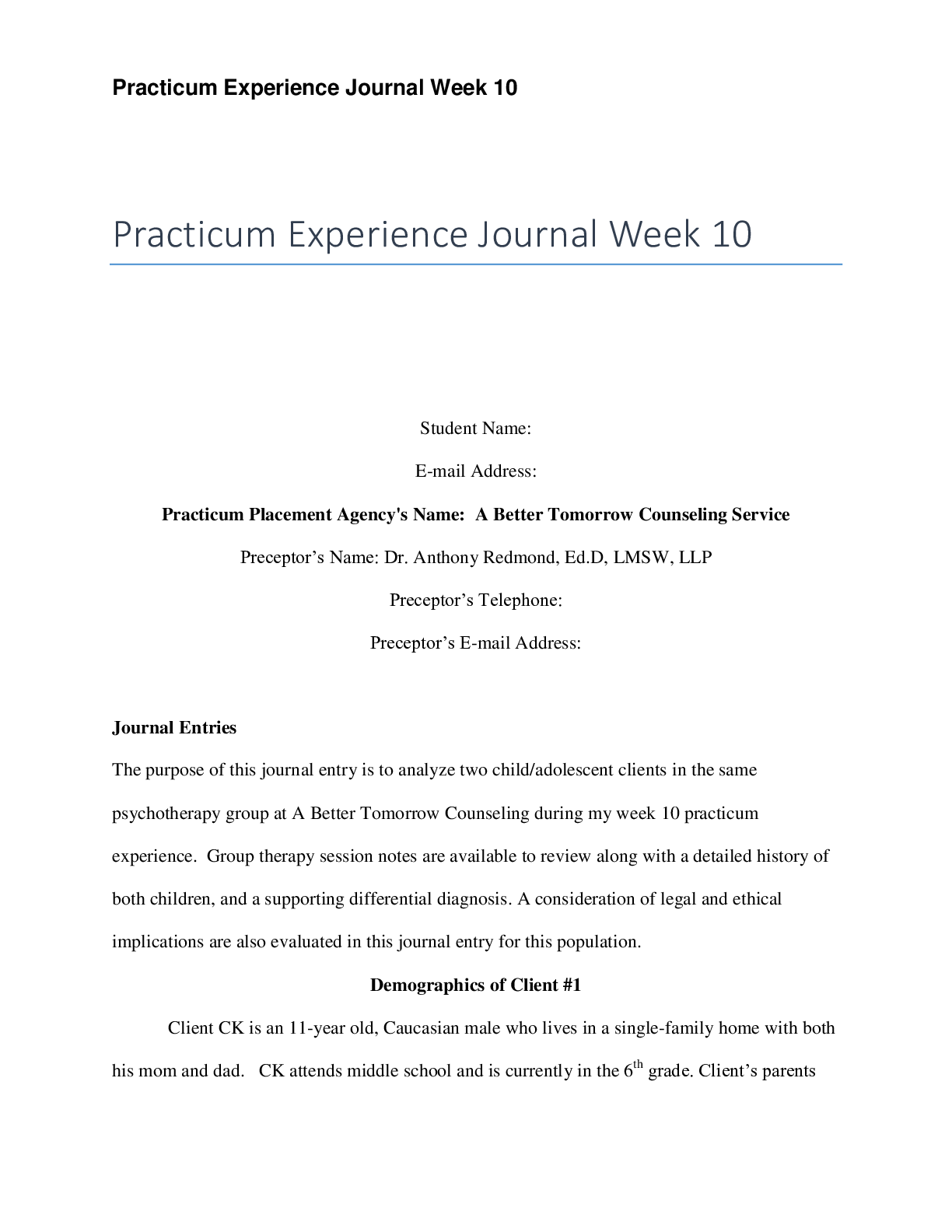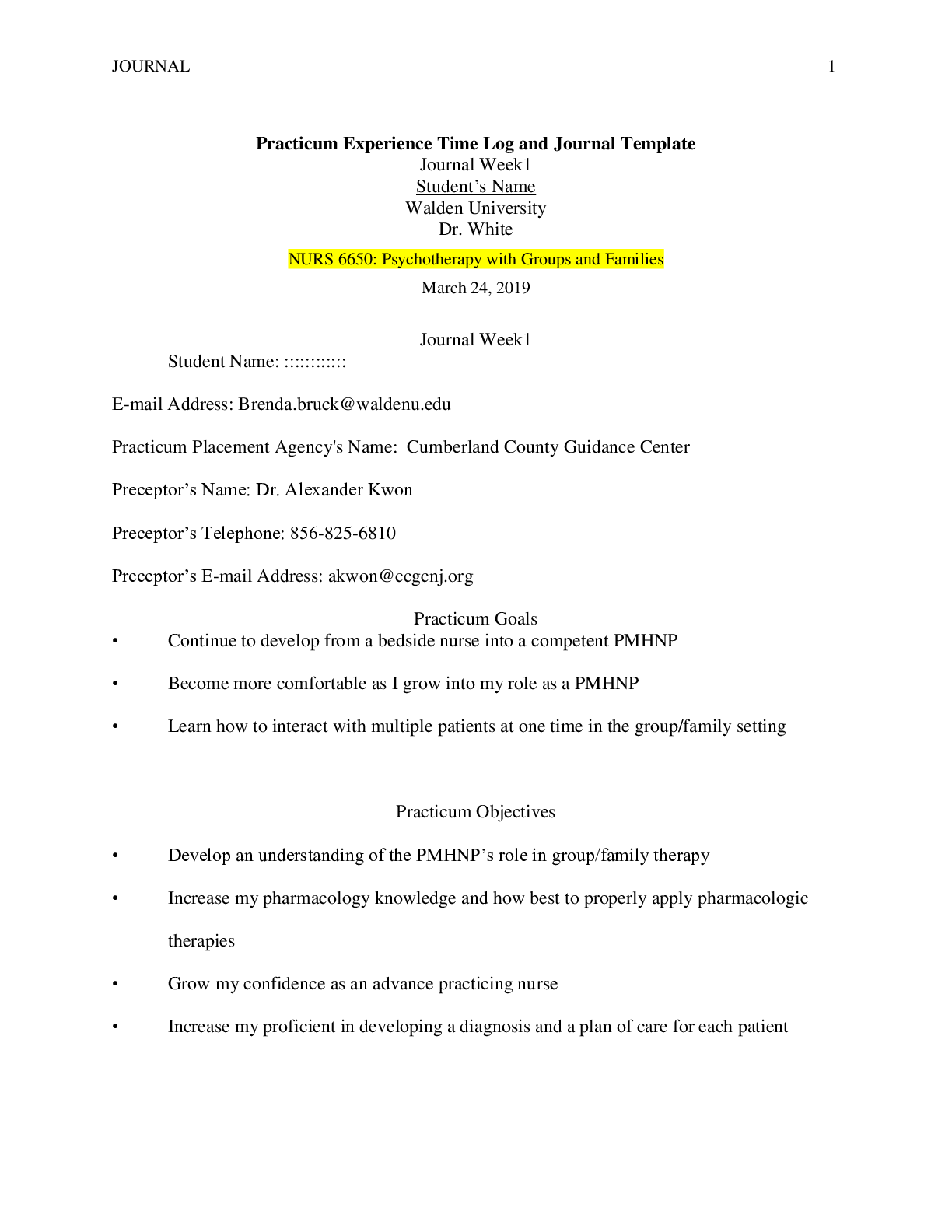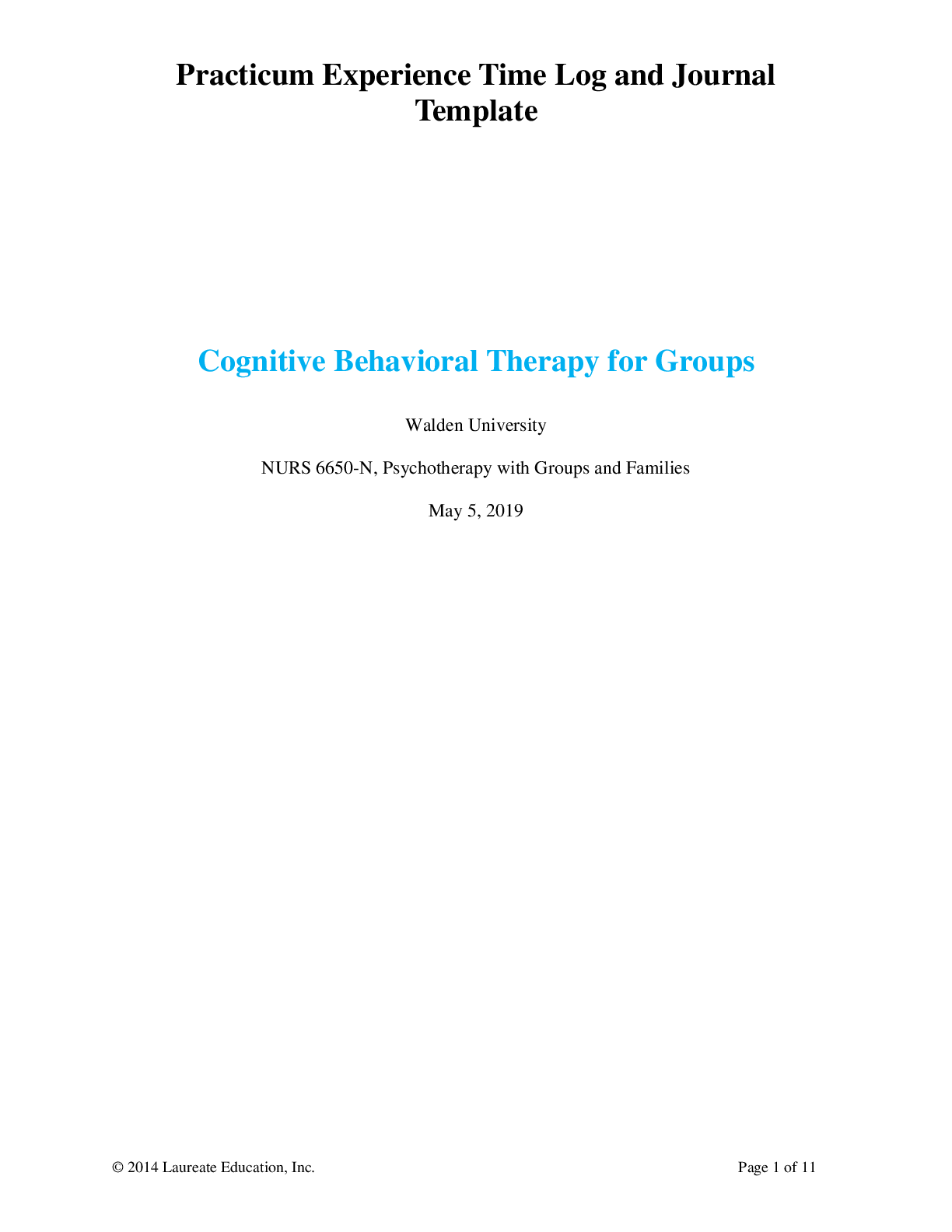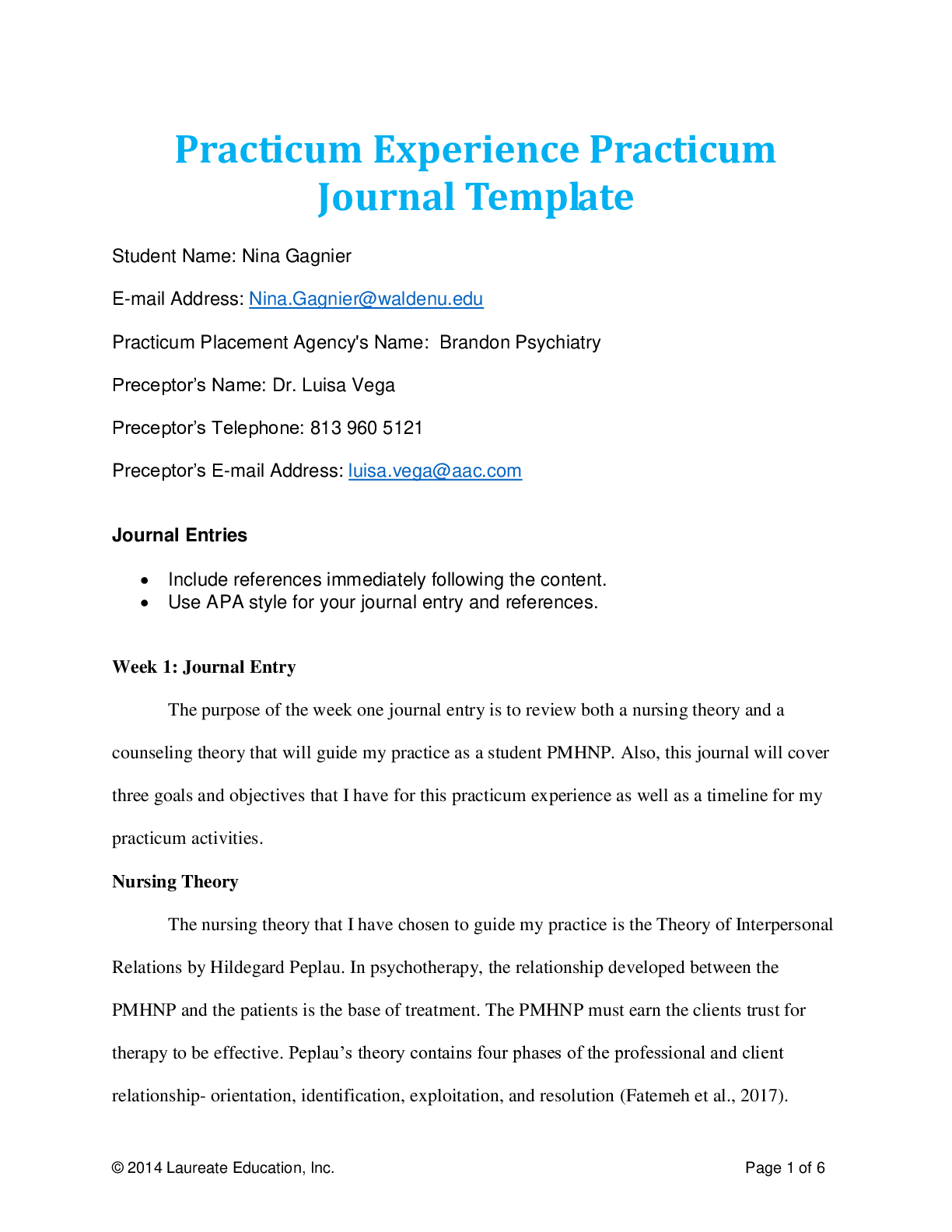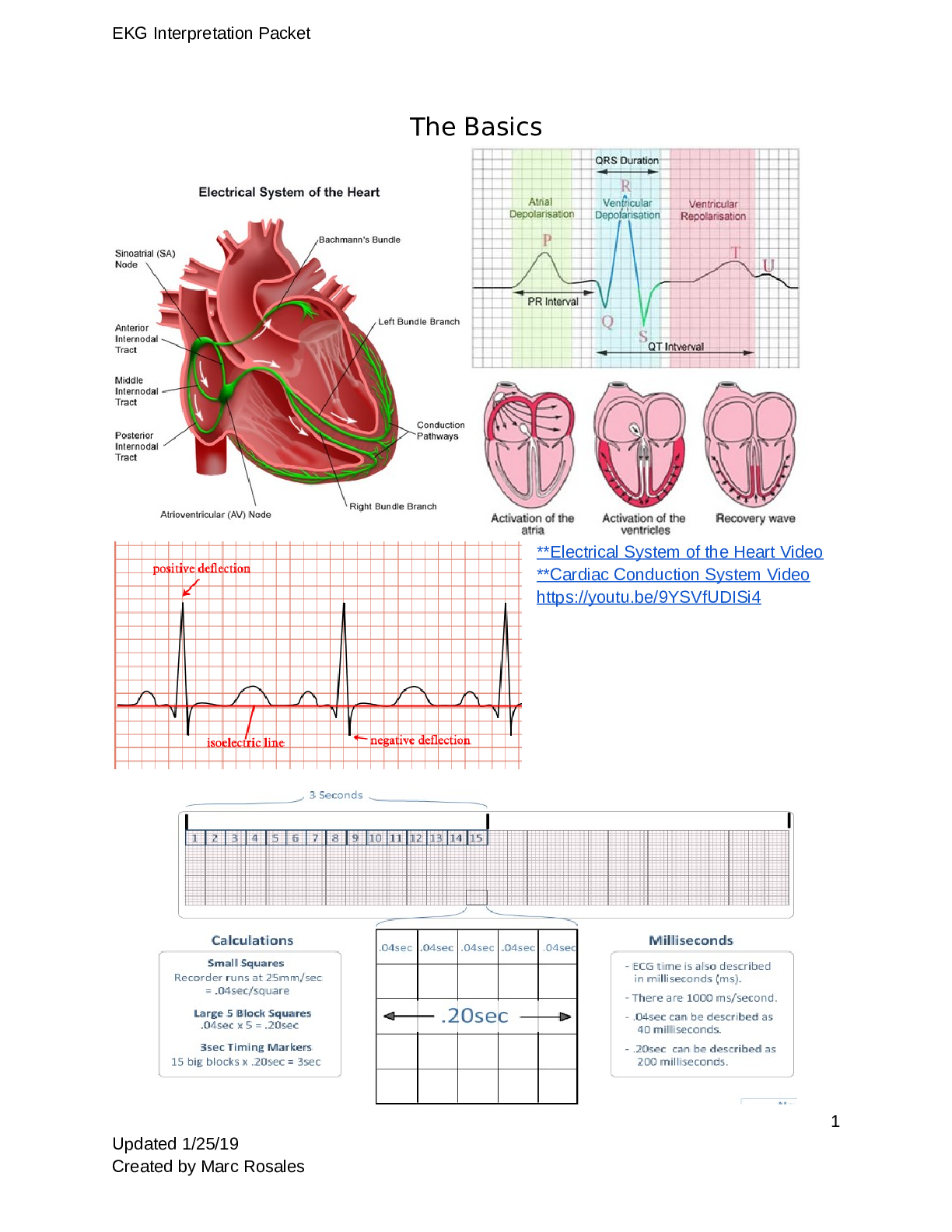*NURSING > PATIENT ASSESSMENTS > NURS 6650-N Psychotherapy with Groups and Families _week10 Assignment 3 | Practicum Experience Time (All)
NURS 6650-N Psychotherapy with Groups and Families _week10 Assignment 3 | Practicum Experience Time Log and Journal Template. Cognitive Behavioral Therapy for Groups | Walden University
Document Content and Description Below
NURS 6650-N Psychotherapy with Groups and Families _week10 Assignment 3 | Practicum Experience Time Log and Journal Template. Cognitive Behavioral Therapy for Groups | Walden University ... Cognitive Behavioral Therapy for Groups Walden University NURS 6650-N, Psychotherapy with Groups and Families May 5, 2019 Time Log . Time Log Week Dates Times Total Hours for This Time Frame Activities/Comments Learning Objective(s) Addressed 2 3/4 3/5 10a-6p 10a-6p 16 Oriented to practice, Understanding of how families are treated in the practice, observed psychotherapy 3 3/11 3/12 10a-6p 10a-6p 16 Worked jointly with NP, some independent Work with NP and families in therapy, worked with NP on diagnosis development 4 3/20 3/21 3/22 10a-6p 10a-6p 10a-6p 24 Worked jointly with NP, more independent Work with NP and families in therapy, worked with NP on diagnosis development 5 3/25 3/26 10a-6p 10a-6p 16 Worked jointly with NP, more independent Work with NP and families in therapy, worked with NP on diagnosis development 6 4/04 4/05 10a-6p 10a-6p 16 Worked jointly with NP, more independent Work with NP and families in therapy, worked with NP on diagnosis development 7 4/8 4/9 10a-6p 10a-6p 16 Worked jointly with NP, more independent Work with NP and families in therapy, worked with NP on diagnosis development 8 4/19 10a-6p 8 Worked jointly with NP, independent in early recovery groups Work with NP, families and now incorporating groups in therapy, working with NP on diagnosis development and related legal aspects 9 4/22 4/23 10a-6p 10a-6p Worked jointly with NP, independent in early recovery groups Work with NP, families and now incorporating groups in therapy, working with NP on diagnosis development and related legal aspects 11 5/6 5/7 10a-6p 10a-6p Worked jointly with NP, independent in early recovery groups Work with NP, families and now incorporating groups in therapy, working with NP on diagnosis development and related legal aspects Total Hours Completed: 144 Journal Entry Week 8 - Cognitive Behavioral Therapy for Groups Group Therapy Progress Note Client:___CT_____________________ Date:__04/19/19________ Group Name: _Early Recovery Group ___ Minutes:__60________ Session #: _9___ Meeting Attended is #: _9___ for this client Number present in group is __7___ of __varies___. Scheduled start time __1730____ End time _1830___ Assessment of client In session procedures: 1) CBT for early recovery in substance use disorders, current focus is diversional activities and coping skill development for life time success 2) __________________________________________________________ 3) __________________________________________________________ Homework: Diversional Activities and Building Coping Skills 1. Developing coping skills -Provide a list of ‘distractions’ that can be used for up to one hour when cravings occur 2. Pursue one new ‘habit’ and provide a summary of how this is being achieved. Such as joining a sports league, reconnecting with family, going back to school. To assist in building a new life away from substance use Other Comments: ______see below_________________________________ ________________________________________________________________ ________________________________________________________________ Saundra Trouslot, RN 04/25/19 ______ Signature Date Description: CT is a 23-year-old Caucasian male with a history of substance use, methamphetamine and cannabis. This substance use has resulted in his expulsion from his second year at University and a move back home with his parents from New York. According to CT, his methamphetamine use began in his second year of college, and his cannabis use was all throughout high school. CT reports no history of substance use among his parents or grandparents other than the occasional glass of wine. CT is a homosexual male diagnosed with HIV approximately four years ago. The client currently has an undetectable viral load and remains on daily antiretroviral therapy, which are his only medications. Both mother and father are medical doctors and practice in the local area. The client is alert and oriented x 4, thoughts are clear and linear, although lacks insight in regard to his substance use. CT’s parents have agreed to his attending this early recovery group, four Narcotics Anonymous groups per week, and parent administered random drug testing in lieu of inpatient or intensive outpatient if CT remains complaint. At this group session, the smell of alcohol was very potent in the room and openly addressed the therapist. All group members denied alcohol use. After the group session, it was apparent that CT was intoxicated. CT agreed to call his parents for a ride home and upon their arrival it was determined CT required a higher level of care and was agreed to attend the intensive outpatient program (IOP). Diagnosis: Per the DSM V - Substance Use Disorder severe Criteria for Substance Use Disorder severe The presence of at least 2 of these symptoms occurring within a 12-month period indicates substance use disorder (SUD): 1. Hazardous use: 2. Social or interpersonal problems related to use: 3. Neglected major roles to use: 4. Withdrawal: 5. Tolerance: 6. Used larger amounts/longer 7. Repeated attempts to control use or quit: 8. Much time spent using: 9. Physical or psychological problems related to use: 10. Activities given up to use: 11. Craving: Case #2 Group Therapy Progress Note Client:___LT____________________ Date:___4/19/19________ Group Name: Early Recovery Minutes:__60________ Session #: _9___ Meeting Attended is #: _4___ for this client Number present in group is __7___ of __varies___. Scheduled start time __1730____ End time _1830__ Assessment of client 1. Participation level: _ Active/Eager __ Variable __ Only Responsive _X_ Minimal __Withdrawn 2. Participation quality: __Expected __Supportive __Sharing __Attentive _ _ Intrusive __Monopolizing __Resistant _X_ Other: __reserved_________________ 3. Mood: __Normal _X Depressed __Anxious _ Angry __ Euphoric __ Other:____________ 4. Affect: _X_Normal __ Intense __ Blunted __ Inappropriate __ Labile __Other: __________ 5. Mental Status:_ X_ Normal __ Lack awareness __Memory Problems __ Disoriented __ Confused __ Disorganized __Vigilant __ Delusions __ Hallucinations __ Other: _______ 6. Suicide/Violence Risk: _X_NONE __ Ideation __ Threat __ Rehearsal __ Gesture __ Attempt 7. Change in Stressors: __ Less severe/fewer __ Different stressors __ More/more severe _X_ Chronic 8. Change in coping ability/skills: _X_ No change __ Improved __ Less able __ Much less able 9. Change in symptoms: _X_ Same __ Less severe __ resolved __ More severe __ Much worse 10. Other observations or evaluations: __________________________________________ In session procedures: 1) CBT for early recovery in substance use disorders, current focus is diversional activities and coping skill development for life time success Homework: Diversional Activities and Building Coping Skills 1. Developing coping skills -Provide a list of ‘distractions’ that can be used for up to one hour when cravings occur 2. Pursue one new ‘habit’ and provide a summary of how this is being achieved. Such as joining a sports league, reconnecting with family, going back to school. To assist in building a new life away from substance use Other Comments: ____See Below _______________________________________________ ________________________________________________________________ ________________________________________________________________ Saundra Trouslot, RN 03/25/19 ______ Signature Date Description: LT is a 19-year-old AA female. The client college student at the local university with no previous treatment of alcohol use or any other substance use. Lt presents for Alcohol use disorder (AUD) and a recent arrest for driving under the influence (DUI). LT reports a history of alcohol use since age 13, however alcohol use increased after her parents divorced when she was 16, and daily use began upon entering college. This is her freshman year at the Diagnosis: Per the DSM V - Alcohol use disorder Criteria for Alcohol use disorder The presence of at least 2 of these symptoms occurring within a 12-month period indicates an alcohol use disorder (AUD). Mild AUD: 2-3 symptoms, Moderate AUD: 4-5 symptoms, Severe Cognitive Behavioral Group Therapy and Substance Use References American Psychiatric Association. (2013). Diagnostic and statistical manual of mental disorders. Washington, DC: Author. Nichols, M. (2014). The essentials of family therapy (6th ed.). Boston, MA: Pearson. =site Parks, K., Ordorica, P., Marroquin-Diaz, V., & Van Noppen, B. (n.d.). Short Term Group Cognitive Behavioral Therapy for Substance Use Disorders: A Pilot Study. AMERICAN JOURNAL ON ADDICTIONS, 26(3), 282–283. Retrieved from https://search-ebscohost- com.ezp.waldenulibrary.org/login.aspx?direct=true&db=edswss&AN=000400574200088 &site=eds-live&scope=site Söchting, I. (2014). Cognitive behavioral group therapy : challenges and opportunities. Chichester, England : Wiley-Blackwell, 2014. Retrieved from https://search-ebscohost- com.ezp.waldenulibrary.org/login.aspx?direct=true&db=cat06423a&AN=wal.EBC17760 83&site=eds-live&scope=site Wheeler, K. (Eds). (2014). Psychotherapy for the advanced practice psychiatric nurse: A how-to guide for evidence-based practices (2nd ed.). New York, NY: Springer Publishing Company. [Show More]
Last updated: 3 months ago
Preview 3 out of 11 pages

Loading document previews ...
Buy this document to get the full access instantly
Instant Download Access after purchase
Buy NowInstant download
We Accept:

Reviews( 0 )
$9.00
Can't find what you want? Try our AI powered Search
Document information
Connected school, study & course
About the document
Uploaded On
Sep 16, 2020
Number of pages
11
Written in
Additional information
This document has been written for:
Uploaded
Sep 16, 2020
Downloads
0
Views
215

